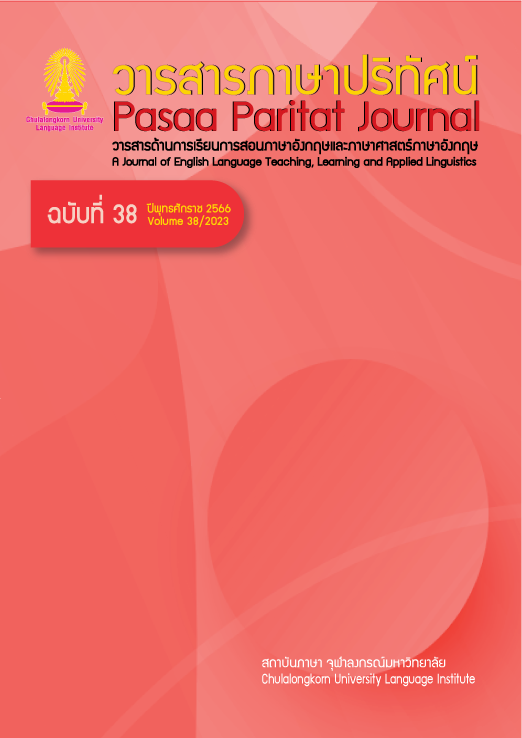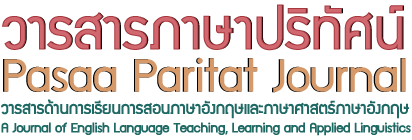การรับรู้ของนักศึกษาที่ศึกษาภาษาอังกฤษเป็นภาษาต่างประเทศต่อภาษาอังกฤษสากล ในการสอนภาษาอังกฤษบริเวณพื้นที่สามเหลี่ยมปากแม่น้ำแม่โขง ประเทศเวียดนาม
DOI:
https://doi.org/10.58837/CHULA.PPJ.38.6คำสำคัญ:
ภาษาอังกฤษในบริบทโลก, การสอนภาษาอังกฤษ, การบูรณาการด้านการสอน, ความหลากหลายทางภาษาบทคัดย่อ
ในการวิจัยก่อนหน้านี้ได้ทำการศึกษาเกี่ยวกับอิทธิพลของภาษาอังกฤษในบริบทโลกที่ส่งผลต่อการสอนภาษาอังกฤษ แต่ข้อมูลเกี่ยวกับการรับรู้ของนักศึกษาภาษาอังกฤษต่อภาษาอังกฤษในบริบทโลกและการบูรณาการเข้ากับวิธีการสอนยังพบได้น้อย การวิจัยนี้จึงจัดทำขึ้นในบริบทของพื้นที่สามเหลี่ยมปากแม่น้ำโขง ประเทศเวียดนาม เพื่อเติมเต็มช่องว่างดังกล่าว โดยทำการสัมภาษณ์แบบกึ่งโครงสร้างกับนักศึกษา ภาษาอังกฤษจำนวน 18 คน ที่ลงทะเบียนเรียนหลักสูตรที่เกี่ยวข้องกับภาษาอังกฤษในบริบทโลกใน 2 มหาวิทยาลัย การวิจัยเชิงคุณภาพนี้ค้นพบรูปแบบและประเด็นต่างๆ ผ่านการวิเคราะห์แก่นสาระที่ผสมผสานทั้งแบบอุปนัยและนิรนัย ผลลัพธ์ที่ได้แสดงให้เห็นถึงการยอมรับความหลากหลายทางภาษาและการเป็น เจ้าของภาษาอังกฤษร่วมกัน นักศึกษาต่อต้านความคิดที่ว่าภาษาอังกฤษเป็นของเจ้าของภาษาเท่านั้น ซึ่งเน้นย้ำความจำเป็นในการยอมรับความหลากหลายของภาษาอังกฤษและวัฒนธรรมผ่านการเรียนการสอน ถึงแม้ว่าผู้เข้าร่วมการศึกษาจะเห็นคุณค่าของภาษาอังกฤษในบริบทโลก แต่พวกเขาก็มีความกังวล เกี่ยวกับความพร้อมในการนำมาใช้ในการสอน โดยอ้างถึงกลุ่มคนที่มีแนวคิดทางการศึกษาที่ตรงกันข้ามหรือ ธรรมเนียมของสถาบันการศึกษา แม้ว่าจะมีกลุ่มตัวอย่างที่จำกัดและบริบททางภูมิศาสตร์ที่เฉพาะเจาะจง ผลการศึกษาค้นคว้านี้ก็สามารถตีความได้อย่างมีนัยยะสำคัญ เพราะช่วยกระตุ้นให้ผู้สอนเพิ่มภาษาอังกฤษ ในบริบทโลกเข้าในหลักสูตรการสอน สร้างทัศนคติเชิงบวกต่อการเรียนการสอนภาษาอังกฤษในบริบทโลก และส่งเสริมการพัฒนาหลักสูตรเพื่อปลูกฝังแนวคิดภาษาอังกฤษในบริบทโลกลงในหลักสูตรการสอนภาษาอังกฤษอย่างมีประสิทธิภาพ ผลสรุปคาดว่าจะมีการเปลี่ยนแปลงกระบวนทัศน์เชิงวิพากษ์ในแวดวง การศึกษาภาษาอังกฤษ รวมถึงโอบรับความหลากหลายที่เป็นสากลและความเข้าใจภาษาอังกฤษที่ตอบสนองบริบทดังกล่าว
เอกสารอ้างอิง
Ahn, H. (2015). Awareness of and attitudes to Asian Englishes: A study of English teachers in South Korea. Asian Englishes, 17(2), 132–151. https://doi.org/10.1080/13488678.2015.1036602
Baker, W., & Ishikawa, T. (2021). Transcultural communication through Global Englishes: An advanced textbook for students. Routledge.
Canagarajah, S. (2013). Translingual practice: Global Englishes and cosmopolitan relations. Routledge.
Çeçen, S., & Tülüce, H. S. (2019). An investigation of pre-service EFL teachers’ attitudes towards speakers from three circles of English. Journal of Language and Linguistic Studies, 15(1), 123–139. https://doi.org/10.17263/jlls.547664
Cogo, A. (2012). English as a lingua franca: Concepts, use, and implications. ELT Journal, 66(1), 97–105. https://doi.org/10.1093/elt/ccr069
Eslami, Z., Moody, S., & Pashmforoosh, R. (2019). Educating pre-service teachers about world Englishes: Instructional activities and teachers' perceptions. TESL-EJ, 22(4), 1–17. https://eric.ed.gov/?id=EJ1204602
Fang, F. (2019). Re-positioning accent attitude in the Global Englishes paradigm: A critical phenomenological case study in the Chinese context. Routledge.
Fang, F., & Baker, W. (2021). Implementing a critical pedagogy of Global Englishes in ELT from the lens of EMI and intercultural citizenship. In, Y. Bayyurt (Ed.), Bloomsbury World Englishes Volume 3: Pedagogies (pp. 177–191). Bloomsbury.
Fang, F., & Ren, W. (2018). Developing students’ awareness of Global Englishes. ELT Journal, 72(4), 384–394. https://doi.org/10.1093/elt/ccy012
Fang, F., & Widodo, H. P. (Eds.). (2019). Critical perspectives on Global Englishes in Asia: Language policy, curriculum, pedagogy and assessment. Multilingual Matters.
Galloway, N. (2017). Global Englishes and change in English language teaching: Attitudes and impact. Routledge.
Galloway, N., & Numajiri, T. (2020). Global Englishes language teaching: Bottom-up curriculum implementation. Tesol Quarterly, 54(1), 118–145. https://doi.org/10.1002/tesq.547
Galloway, N., & Rose, H. (2015). Introducing Global Englishes. Routledge.
Galloway, N., & Rose, H. (2018). Incorporating Global Englishes into the ELT classroom. ELT Journal, 72(1), 3–14. https://doi.org/10.1093/elt/ccx010
Hao, T. T., & Moore, P. (2015). Vietnamese English teachers’ perceptions on incorporating world Englishes into Their teaching. Language Education in Asia, 6(2), 107–121. http://dx.doi.org/10.5746/LEiA/15/V6/I2/A3/Tran_Moore
Hao, T. T., & Phuong, N. D. (2017). World Englishes from a holistic view and considerations on English education in Vietnam. VNU Journal of Foreign Studies, 33(6), 41–55. https://doi.org/10.25073/2525-2445/vnufs.4207
Huong, T. N. N., & Hiep, P. H. (2010). Vietnamese teachers’ and students’ perceptions of global English. Language Education in Asia, 1(1), 48–61. https://leia.org/LEiA/LEiA%20VOLUMES/Download/LEiA_V1_2010/LEiA_V1_05_Ton_Pham_Vietnamese_Teachers_and_Students_Perceptions_of_Global_English.pdf
Jenkins, J. (2011). Accommodating (to) ELF in the international university. Journal of Pragmatics, 43(4), 926–936. https://doi.org/10.1016/j.pragma.2010.05.011
Jenkins, J. (2015). Repositioning English and multilingualism in English as a lingua franca. Englishes in Practice, 2(3), 49–85. https://doi.org/10.1515/eip-2015-0003
Jenkins, J., Cogo, A., & Dewey, M. (2011). Review of developments in research into English as a lingua franca. Language Teaching, 44(3), 281–315. https://doi.org/10.1017/S0261444811000115
Jindapitak, N. (2019). English as an ASEAN lingua franca and the role of nativeness in English education in Thailand: Moving toward the ASEAN Economic community (AEC). English Today, 35(2), 36–41. https://doi.org/10.1017/S026607841800024X
Jindapitak, N. (2022). Addressing learners’ attitudes toward English language variation through a Global Englishes awareness raising program. [Doctoral dissertation, Prince of Songkla University]. PSU Knowledge Bank.
Jindapitak, N., Teo, A., & Savski, K. (2022). Bringing Global Englishes to the ELT classroom: English language learners’ reflections. Asian Englishes, 24(3), 279–293. https://doi.org/10.1080/13488678.2022.2033910
Kang, O. (2015). Learners' perceptions toward pronunciation instruction in three circles of world Englishes. Tesol Journal, 6(1), 59–80. https://doi.org/10.1002/tesj.146
Kirkpatrick, A. (2021). Teaching (about) World Englishes and English as a lingua franca. In A. Onysko (Ed.), Research developments in World Englishes (pp. 251–269). Bloomsbury Academic.
Kusumaningputri, R. (2020). Exposure to Englishes in listening classrooms: The perspectives of Indonesian ESL learners. Journal of English Education and Linguistics Studies, 7(1), 49–68. https://doi.org/10.30762/jeels.v7i1.1628
Luo, W. H. (2017). Teacher perceptions of teaching and learning English as a lingua franca in the expanding circle: A study of Taiwan: What are the challenges that teachers might face when integrating ELF instruction into English classes? English Today, 33(1), 2–11. https://doi.org/10.1017/S0266078416000146
Matsuda, A. (2018). Is teaching English as an international language all about being politically correct? RELC Journal, 49(1), 24–35. https://doi.org/10.1177/0033688217753489
Matsuda, A. (2020). World Englishes and Pedagogy. In C. L. Nelson, Z. G. Proshina, & D. R. Davis (Eds.), The handbook of World Englishes (pp. 686–702). John Wiley & Sons, Inc.
Pennycook, A. (2007). Global Englishes and transcultural flows. Routledge.
Rajprasit, K. (2021). ‘Do as WE do’: Teaching World Englishes in a general English course to Thai students. RELC Journal, 54(1), 291–299. https://doi.org/10.1177/00336882211011276
Rajprasit, K., & Marlina, R. (2019). An attempt to raise Thai students’ awareness of World Englishes in a General English program. Indonesian JELT: Indonesian Journal of English Language Teaching, 14(1), 19–34. https://doi.org/10.25170/ijelt.v14i1.1416
Rose, H., McKinley, J., & Galloway, N. (2021). Global Englishes and language teaching: A review of pedagogical research. Language Teaching, 54(2), 157–189. https://doi.org/10.1017/S0261444820000518
Rose, H., & Galloway, N. (2019). Global Englishes for language teaching. Cambridge University Press.
Sadeghpour, M., & Sharifian, F. (2017). English language teachers’ perceptions of world Englishes: The elephants in the room. Asian Englishes, 19(3), 242–258. https://doi.org/10.1080/13488678.2017.1362782
Seidlhofer, B. (2011). Understanding English as a lingua franca. Oxford University Press.
Sharifian, F. (2013). Globalisation and developing metacultural competence in learning English as an International Language. Multilingual Education, 3(7), 1–11. https://doi.org/10.1186/2191-5059-3-7
Takahashi, R. (2017). Attitudes of Japanese learners and teachers of English towards non-standard English in coursebooks. Changing English, 24(1), 42–52. https://doi.org/10.1080/1358684X.2016.1228444
Tarrayo, V. N., Ulla, M. B., & Lekwilai, P. (2021). Perceptions toward Thai English: A study of university English language teachers in Thailand. Critical Inquiry in Language Studies, 18(4), 374–397. https://doi.org/10.1080/15427587.2021.1919113
Widdowson, H. (2015). ELF and the pragmatics of language variation. Journal of English as a Lingua Franca, 4(2), 359–372. https://doi.org/10.1515/jelf-2015-0027
ดาวน์โหลด
เผยแพร่แล้ว
รูปแบบการอ้างอิง
ฉบับ
ประเภทบทความ
สัญญาอนุญาต
ลิขสิทธิ์ (c) 2023 วารสารภาษาปริทัศน์

อนุญาตภายใต้เงื่อนไข Creative Commons Attribution-NonCommercial-NoDerivatives 4.0 International License.



